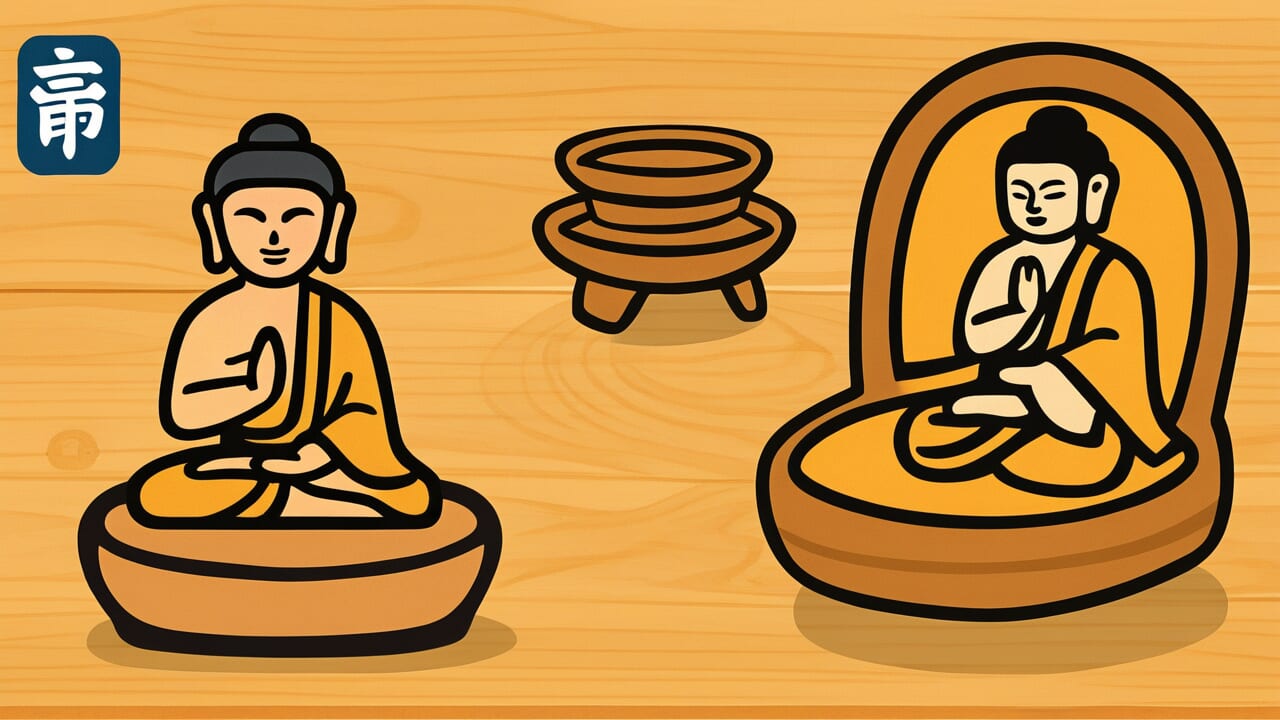How to Read “Geta and Amida are both pieces of the same wood”
Geta mo Amida mo onaji ki no kire
Meaning of “Geta and Amida are both pieces of the same wood”
This proverb means that all people share the same essential nature, regardless of their social status or position.
No matter how powerful someone is or how poor their circumstances, their fundamental humanity remains the same.
People use this saying to warn against discriminating or looking down on others based on power, wealth, or social standing.
It also encourages people who put themselves down too much. The proverb reminds them that everyone has equal value as a human being.
Even today, we often judge people by their job titles, income, or education. But this proverb urges us to see what truly matters.
It reminds us not to be fooled by surface differences. Every person holds the same human dignity, no matter what.
Origin and Etymology
The exact origin of this proverb is hard to confirm in historical texts. However, the structure of the phrase itself offers interesting insights.
The essence lies in pairing two seemingly opposite things: “geta” and “Amida.”
Geta are wooden sandals that common people wore every day. They got muddy, wet, worn down, and eventually thrown away as disposable items.
Amida refers to Amida Buddha. People bowed their heads and prayed to Buddhist statues, which were mainly carved from wood in those days.
So geta that people stepped on and Buddha statues that people worshipped both came from the same material: wood. This proverb focuses on that simple fact.
Scholars believe it likely emerged from common culture during the Edo period. The strict class system of that era made this message of equality resonate deeply with people.
You can also feel Buddhist influence in this saying. Buddhism teaches that all living beings have Buddha nature within them.
This philosophy may have been expressed through the metaphor of wood. The insight that noble and humble things share the same essence is packed into this short phrase.
Usage Examples
- The company president and the new employee are like “Geta and Amida are both pieces of the same wood”—they have equal value as human beings
- There’s no need to give celebrities special treatment; “Geta and Amida are both pieces of the same wood” after all
Universal Wisdom
This proverb has been passed down through generations because it touches on the eternal themes of discrimination and equality that exist in all human societies.
Humans have a strange tendency. We flatter those above us in status and act arrogantly toward those below us.
This weakness has existed across all times and cultures. Yet humans also have a conscience that tells us “this is wrong.”
These two contradictory feelings constantly struggle within us.
The brilliance of “Geta and Amida are both pieces of the same wood” lies in presenting a concrete fact everyone can accept.
The wood material doesn’t change. This is an undeniable truth. Our ancestors didn’t preach abstract sermons.
Instead, they conveyed the truth of equality through visible, tangible facts.
Everyone wants to be recognized and respected. But to receive respect, we must first respect others.
This proverb provides the foundation for that spirit of mutual respect. It teaches us the importance of seeing essence through a simple metaphor.
For humans who easily get distracted by surface differences, it offers a crucial reminder.
When AI Hears This
Whether a piece of wood becomes geta or an Amida Buddha statue dramatically changes the information that object carries.
Information theory founder Shannon defined information as how much it reduces the receiver’s uncertainty. The physical state of the wood—its atomic arrangement and molecular structure—remains essentially the same.
Yet the information transmitted varies completely depending on context.
For example, someone seeing a Buddha statue in a temple receives the information “object of worship.” Someone seeing geta at an entrance receives “tool for going outside.”
From the same physical entity, context—including observer expectations and environment—extracts entirely different information.
This shows that information doesn’t exist within matter itself but emerges from relationships within the entire system.
Even more interesting is the reversal between physical entropy and semantic entropy. As a wood piece, interpretations are wide open, so semantic entropy is high.
But when processed into geta or a statue, physical order increases and entropy decreases. At the same time, social meaning converges to one interpretation, lowering semantic entropy too.
This proverb expresses a core principle of information theory through everyday material. Information is an emergent property co-created by observers and context.
Lessons for Today
For those of us living in modern society, this proverb offers an important perspective.
We compare ourselves to others on social media and feel depressed. We judge people by their titles and income. This has become normal.
That’s exactly why this saying matters more than ever.
When you interact with someone, try seeing them as a person, not just their job or position.
Don’t look down on someone because they’re your subordinate or younger. Treat them with respect as a fellow human being.
On the flip side, don’t be overly intimidated just because someone is your boss or a celebrity. Relate to them naturally as an equal.
This attitude becomes the first step toward building rich human relationships.
At the same time, this proverb encourages you personally. Whatever your current situation, your value as a human being equals everyone else’s.
Even if you fail or face setbacks, your essential worth never decreases.
Geta and Amida are both pieces of the same wood. Keep these words in your heart. Choose a way of living that values yourself while also valuing others.



Comments